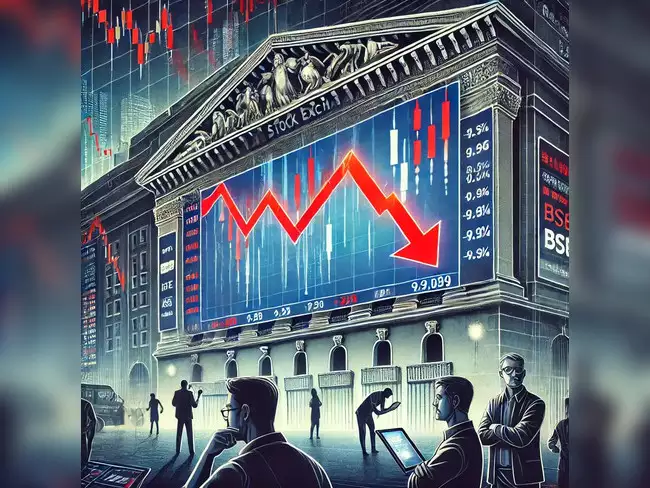Monday Mayhem: Investors Lose Rs 8 Lakh Crore as Sensex Crashes 1,400 Points – 4 Factors Behind the Fall
The Indian stock market started the week on a bleak note, with the Sensex plummeting by 1,400 points, leading to a massive loss of Rs 8 lakh crore in investor wealth. This sharp decline has sent shockwaves throughout the financial world, raising questions about the underlying causes of this sudden downturn. Here, we break down the four main factors contributing to the significant market slide.
1. Global Economic Uncertainty
One of the primary drivers behind this steep fall is the ongoing global economic turbulence. Concerns over rising geopolitical tensions, particularly in regions vital for energy supply, have rattled global markets. This uncertainty has spurred investors to adopt a risk-averse approach, pulling back from equities and seeking safe-haven assets like gold and government bonds. Such trends have a ripple effect, impacting emerging markets, including India.
2. Weak Corporate Earnings Reports
Another significant factor weighing down the Sensex is the disappointing Q2 earnings from some major companies. Despite the anticipation of a rebound post-pandemic, the financial results of several industry leaders revealed underperformance due to weak demand and rising costs. Sectors like banking, IT, and manufacturing have particularly been hit hard, leading to bearish sentiments among traders and analysts.
3. Rising Interest Rates and Inflation Fears
Central banks worldwide, including the Reserve Bank of India (RBI), have been under pressure to combat persistent inflation. Recent remarks suggesting possible interest rate hikes to tame inflation have spooked investors. Higher interest rates make borrowing more expensive and could potentially dampen economic growth. This has led to significant sell-offs as market participants reassess the future profitability of companies facing higher debt servicing costs.
4. Foreign Institutional Investors (FIIs) Outflows
Foreign Institutional Investors (FIIs) have been net sellers in the Indian market over recent weeks. The current market sell-off is no exception, with FIIs pulling out capital amidst global economic jitters and tightening monetary policies. These large-scale withdrawals put additional pressure on the domestic stock market, causing more pronounced declines in stock prices.
Impact on Key Sectors
The crash had a widespread impact across various sectors. The banking sector, often a bellwether of the economy’s health, saw significant dips, with shares of major public and private banks retreating sharply. IT and tech stocks, already under pressure from declining global demand, also faced steep declines, adding to investor woes.
Investor Takeaway
Market analysts suggest caution and advise investors to stay vigilant, particularly in a volatile global landscape. The crash underlines the importance of diversification and a focus on long-term investment strategies to navigate these turbulent periods.
Conclusion
While Monday’s sharp fall has undoubtedly shaken investor confidence, experts believe that strong fundamentals in the Indian economy may help cushion the impact over time. For now, the market remains on edge, waiting for clearer signals from both domestic and international fronts.
#SensexCrash #StockMarketUpdate #Investing #EconomicUncertainty #InflationFears #FIISellOff #InvestorAlert



